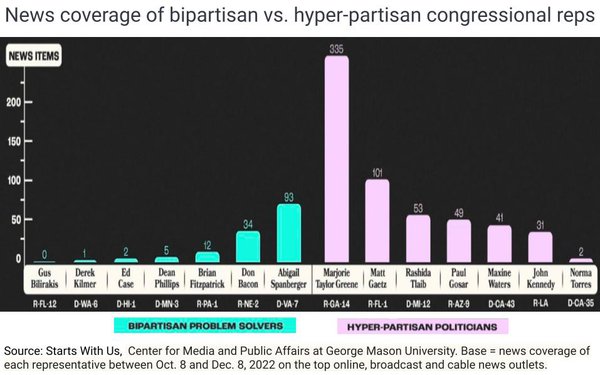
The only thing more partisan than American politics is
points of view about how -- and how much -- the media cover political leaders based on their perceived partisanship.
Last week's House subcommittee hearing on the "weaponization" of media was
a good example of that, focusing on specious, overplayed "exposes" like Elon Musk's release of the so-called "Twitter Files" to muckraking anti-mainstream media journalist Matt Taibbi, who logged
selective outtakes of Twitter exec correspondence to make a partisan case. Or even worse, Fox News prime-time antagonist Tucker Carlson's equally selective use of the January 6th Committee's
unreleased surveillance footage to do the same.
According to at least one analysis several days after Carlson's exclusive coverage, he used less than four minutes from 40,000 hours of
surveillance footage to make his case.
advertisement
advertisement
But the height of this topsy-turvy alternative fact-based case-making was when Matt Gaetz used the weaponization subcommittee hearing to call for an
investigation of NewsGuard, the non-partisan journalist-based media watchdog that fact-checks news publishers and telecasters for veracity.
It's too bad NewsGuard doesn't factcheck
Congressional representatives, because they could have caught Gaetz in a lie when he claimed NewsGuard is a "U.S. government-backed entity." It is an independent, free-market data and analytics
service used primarily by advertisers and agencies to make sure they're putting their ad dollars in news outlets that are fair and balanced.
It's not the first time Gaetz spun an alternative
truth to -- ironically -- generate media coverage to boost his own attention and fund-raising. And he is not alone. According to a Center for Media
and Public Affairs at George Mason University study released today by Starts With Us, a non-profit promoting non-partisanship, Gaetz was among the hyper-partisan representatives generating the
most media coverage from their rants and distortions.
No. 1, according to the study, was Marjorie Taylor Greene.
Put it wasn't just ultra-right-wing nuts garnering so much media
attention. The study found that hyper-partisan representatives on the left also attract much more media attention than their non-partisan peers.
As a journalist and editor, I get it. Extremism
of all kinds is inherently more newsworthy than moderate points of view. But when it comes to political and civil discord, that's a real paradox -- and problem -- for U.S. society, because it is
giving way too much oxygen to and amplifying our divisions at a time when Americans need to be pulling more together.
“The sheer scale of the coverage imbalance is shocking,”
Starts With Us CEO Tom Fishman notes in a statement released with the study. “We understand that media is a business, and partisan voices warrant a place in the coverage. But when the crucial
work of bipartisan problem solving gets this dramatically overlooked, citizens despair and disengage. We’re rallying our community to let the media know there’s a hunger for the full
picture, and we’re committed to amplifying those stories.”